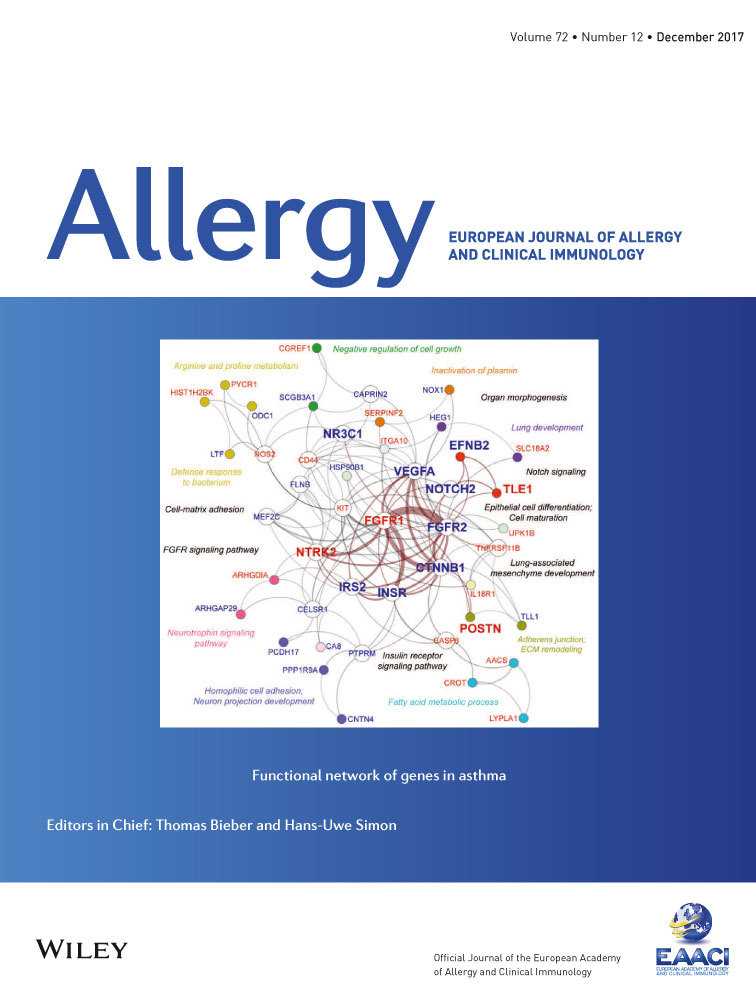Duration and exclusiveness of breastfeeding and risk of childhood atopic diseases
Funding information
The Generation R Study is made possible by financial support from the Erasmus MC, Rotterdam, the University Medical Center Rotterdam, and the Netherlands Organization for Health Research and Development. Vincent Jaddoe received an additional grant from the Netherlands Organization for Health Research and Development (ZonMw-VIDI). Liesbeth Duijts received additional funding from the cofunded programme ERA-Net on Biomarkers for Nutrition and Health (ERA-HDHL) (ALPHABET project, Horizon 2020 (grant agreement No 696295; 2017), Netherlands Organization for Health Research and Development (No 529051014; 2017), Science Foundation Ireland (No SFI/16/ERA-HDHL/3360), and the European Union). The project received funding from the European Union's Horizon 2020 research and innovation programme under grant agreement No 733206 (LIFECYCLE). The researchers are independent from the funders. The study sponsors had no role in the study design, data collection, data analysis, interpretation of data, and preparation, review, or approval of the manuscript.
Abstract
Background
Breastfeeding may have immune modulatory effects that influence the development of childhood allergic sensitization and atopic diseases. We aimed to examine the associations of breastfeeding with childhood allergic sensitization, inhalant or food allergy and eczema, and whether any association was affected by disease-related modification of the exposure or modified by maternal history of allergy, eczema, or asthma.
Methods
This study among 5828 children was performed in a population-based prospective cohort from fetal life onwards. We collected information on duration (<2 months, 2-4 months, 4-6 months, and ≥6 months) and exclusiveness (nonexclusive vs exclusive for 4 months) of breastfeeding in infancy by postal questionnaires. At age 10 years, inhalant allergic sensitization and food-allergic sensitization were measured by skin prick tests, and physician-diagnosed inhalant and food allergy by a postal questionnaire. Data on parental-reported eczema were available from birth until age 10 years.
Results
We observed no association of breastfeeding with any allergic sensitization, physician-diagnosed allergy, or combination of these outcomes. Shorter breastfeeding duration was associated with an overall increased risk of eczema (P-value for trend <.05). Nonexclusively breastfed children had an overall increased risk of eczema (adjusted odds ratio [95% confidence interval]: 1.11 [1.01, 1.23]), compared with children exclusively breastfed for 4 months. Risk period-specific sensitivity analyses, additional adjustment for ointment use for eczema at age 2 months, and cross-lagged modeling showed no consistent results for disease-related modification of the exposure. Results were not modified by maternal history of allergy, eczema, or asthma (lowest P-value for interaction=.13).
Conclusion
Shorter duration or nonexclusiveness of breastfeeding is associated with a weak overall increased risk of eczema but not allergic sensitization or physician-diagnosed allergy at age 10 years.
Abstract





